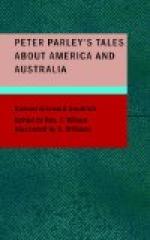The consequences of this bad conduct were what might have been expected: some died by sickness caused by intemperance, some fell in brawls between themselves about their ill-gotten spoil, and others were cut off by the Indians, whom they had so shamefully treated, and who afterwards pulled dawn and burnt their fort.
The misfortunes which had befallen the Spaniards in the vicinity of this harbour threw a gloom over the place, and it was considered by the superstitious mariners as under some baneful influence. The situation was low and unhealthy, and not capable of improvement; Columbus therefore determined to remove the settlement.
With this view he made choice of a situation more healthy and commodious than that of Navidad, and having ordered the troops and the various persons to be employed in the colony to be immediately disembarked, together with the stores, ammunition, and all the cattle and live-stock, he traced out the plan of a town in a large plain near a spacious bay; and obliging every person to put his hand to the work, the houses were soon so far advanced as to afford them shelter, and forts were constructed for their defence.
This rising city, the first that Europeans founded in the new world, he named Isabella, in honour of his patroness the Queen of Castile.
As long as the Indians had any prospect that their sufferings might terminate by the voluntary departure of the invaders, they submitted in silence, and dissembled their sorrow; but now that the Spaniards had built a town—now that they had dug up the ground and planted it with corn—it became apparent that they came not to visit the country, but to settle in it.
They were themselves naturally so abstemious and their wants so few, that they were easily satisfied with the fruits of the island, which, with a handful of maize or a little of the insipid bread made of the cassava root, were sufficient for their support.
But it was with difficulty they could afford subsistence for the new guests. The Spaniards, though considered an abstemious people, appeared to them excessively voracious. One Spaniard consumed as much as several Indians; this keenness of appetite appeared so insatiable, that they supposed the Spaniards had left their own country because it did not produce enough to gratify their immoderate appetites, and had come among them in quest of nourishment.
Columbus having taken all the steps which he thought necessary to ensure the prosperity of his new colony, entrusted the command of the military force to Margaritta, and set sail with three vessels to extend his discoveries; but, after a long and tedious voyage, in which he endured every hardship, the most important discovery he made was the island of Jamaica.
Having been absent much longer than he had expected, he returned to his new settlement, but the colonists had become refractory and unmanageable.
No sooner had he left the island on his voyage of discovery, than the soldiers under Margaritta dispersed in straggling parties over the island, lived at discretion upon the natives, wasted their property, and treated that inoffensive race with the insolence of military oppression.




